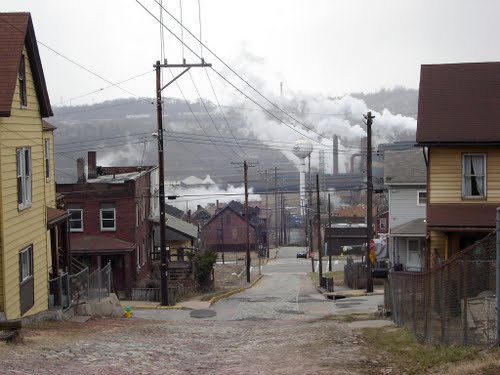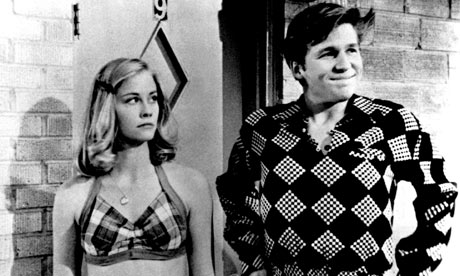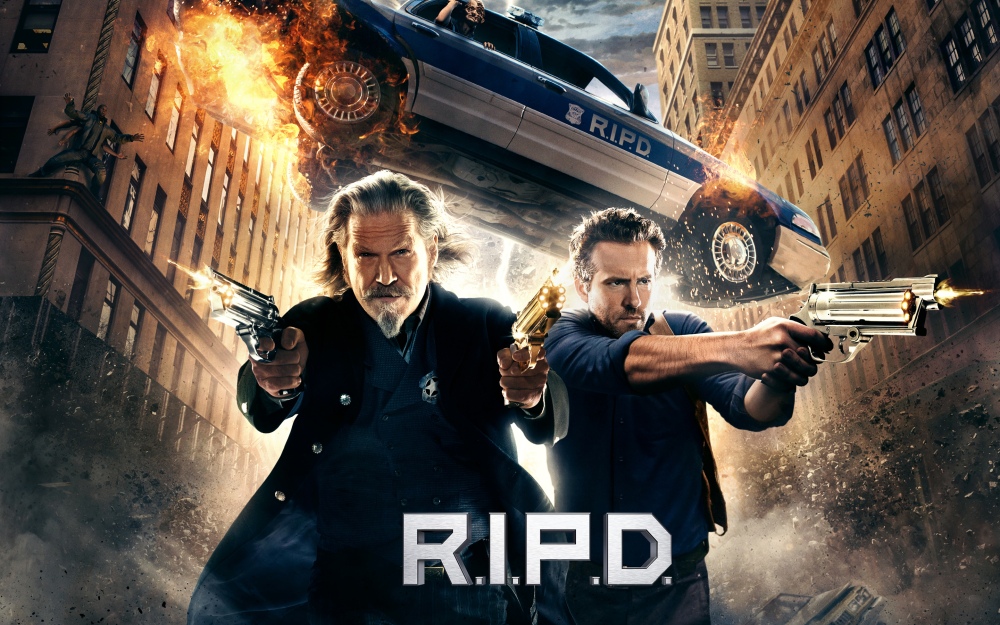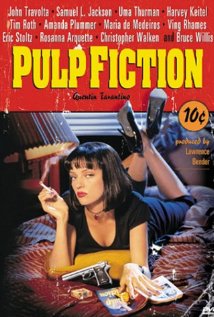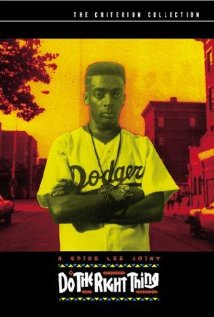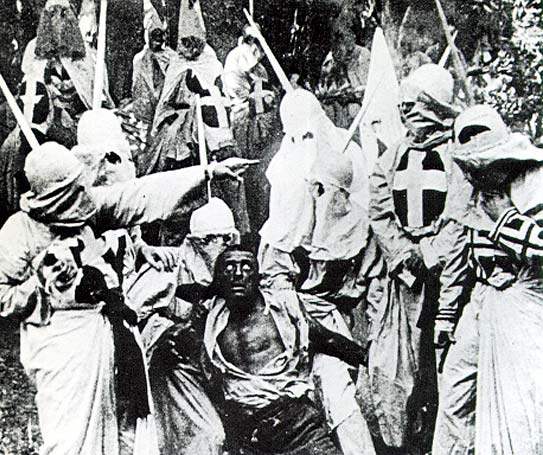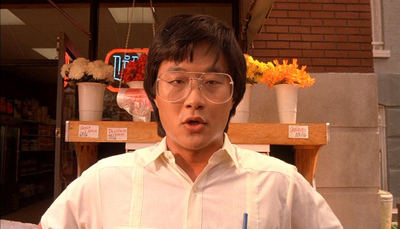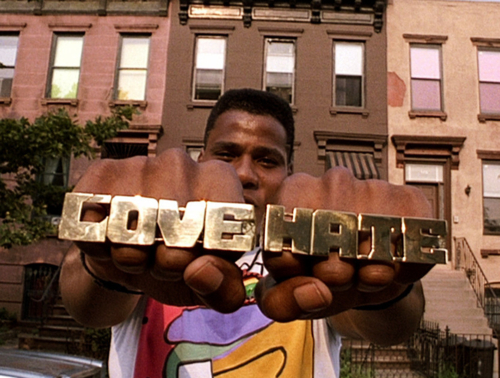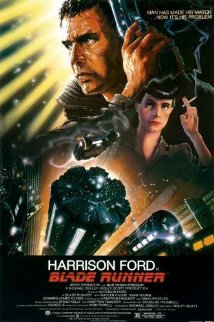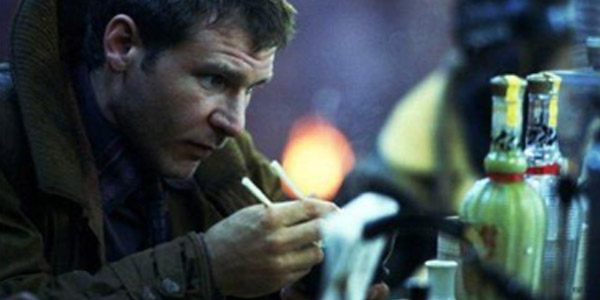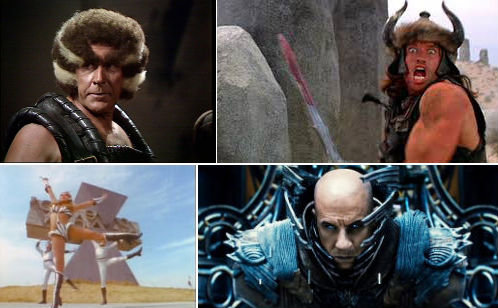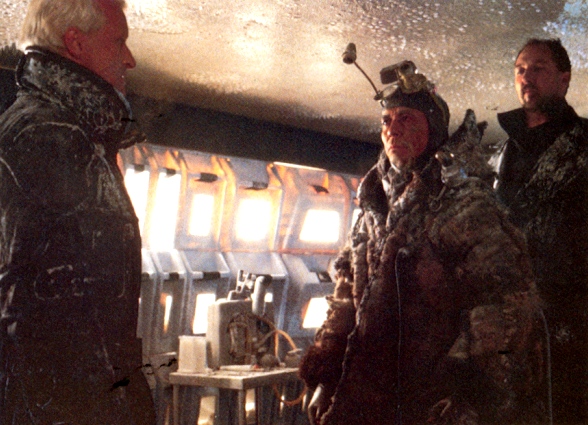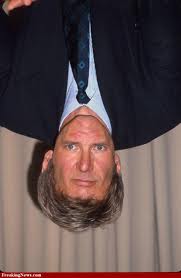100 Movies … 100 Posts: #94. Pulp Fiction (1994)
 This is post #7 in my series, 100 Movies … 100 Posts. In this ongoing series, I’m watching and writing about each film on the American Film Institute’s list of 100 greatest movies from #100 to #1. I’m not just writing a review of each movie. I am going to write a piece about whatever I find most pressing, as a critique of the film, an address of the issues it brings up, or my own experiences with the film. It will serve as an examination of the list itself and of political issues in Hollywood and the film industry.
This is post #7 in my series, 100 Movies … 100 Posts. In this ongoing series, I’m watching and writing about each film on the American Film Institute’s list of 100 greatest movies from #100 to #1. I’m not just writing a review of each movie. I am going to write a piece about whatever I find most pressing, as a critique of the film, an address of the issues it brings up, or my own experiences with the film. It will serve as an examination of the list itself and of political issues in Hollywood and the film industry.
Without further ado, #94 “Pulp Fiction”
——————————————-
I have fond memories of “Pulp Fiction.” The first time I watched it, I was in college. I had been working at a movie theater during winter and summer breaks, and talking to my coworkers who were all film snobs people. So, I was starting to get interested in more than the typical bang-bang, hero saves the day, gets the girl, beats the baddie, binary thinking movies.
“Pulp Fiction” was the one that wined and dined me into becoming a film snob guy too.
I got it from the library actually, but after I watched it, I was in such awe that I went out and bought all of Tarantino’s films on dvd the next day at Best Buy. Kill Bill Vol. 2 had just come out, so it was only 5 films, but that was a big deal for me. The only other movies I’d owned on dvd at the time were the “Lord of the Rings” extended editions.
So, I’ve seen the film probably once a year or every other year since then. I almost know it by heart. It’s still a joy to watch.
In every Tarantino film, the opening credits sequence, after the opening scene, always makes me want to live in that film. Ok, not really, because that would be a horrifying world to live in.
“Pulp Fiction” is certainly no different. When the tremolo of Dick Dale’s “Misirlou” kick in, then it switches to “Jungle Boogie,” you know that if you ever wanted someone to make you a mixtape of old music, regardless of whether you’re even into mixtapes (or playlists for the young-uns), you want it to be Quentin Tarantino, and you want to turn it up loud, like you’re in a movie theater. When you watch his movies, you get the added bonus of hearing that mixtape throughout.
For all the style and flash of this film, the area where it really makes its mark is in the dialogue. Tarantino is a master of writing a bunch of shit that you never knew you cared about and having his actors talk through it as naturally as if they were having a real conversation. There’s no real reason why you should care about it, since it has nothing to do with the rest of the movie, but it’s fun to listen to. Case in point, everyone in the U.S. who knows what people in France call a quarter-pounder hamburger, knows that stupid little fact because they learned it from this movie, or from someone who was randomly quoting this movie (they have the metric system in Europe).
Later they discuss the sensuality of foot massages, and Jules gives Vincent a hard time about going on a “date” with the boss’ wife. You know, like guys do.
Even though the dialogue itself is basically pointless, it serves a purpose. It bonds the audience with these characters and displays their humanity. The audience feels like its playing witness to a small talk conversation between two people, just shooting the shit. Even though in this case, those two people are cold-blooded killers, Vincent and Jules.

John Travolta in “Hairspray.” Look, it’s funny because he plays a woman, alright? Because men wearing a fat suit, a wig and a dress never gets old, right? Anyway, Travolta had a great career after 1995. Then, there was also “Battlefield Earth.”
That dialogue helped John Travolta revive his career as Vincent, and Samuel L. Jackson finally get his break through to stardom as Jules. Both were nominated for Oscars for their parts (though “Forrest Gump” wiped the floor with this film in award count). Both went on to have rather mediocre careers afterward. Actually, Travolta’s career has been terrible since 1995, let’s be honest. Uma Thurman also got her breakout role here, and aside from her other Tarantino film “Kill Bill,” also went on to do very little afterward.
It’s wierd that both Travolta and Jackson barely made the cast, as it’s impossible to imagine anyone else in those roles, let alone the other actors who were pegged for it. Michael Madsen has been great playing Tarantino characters, but his gruffness would have overpowered the role, whereas Travolta brought a softness to it that made him likable, even sympathetic, even as a cold-blooded hitman. Bruce Willis as Vincent wouldn’t have worked at all. Lawrence Fishburne as Jules might have been interesting to see, but he doesn’t have near the acting range Jackson displays so naturally.
The main cast is supported by a crowd of talented actors. Willis has rarely been better than in his role as Butch the aging, but still game, boxer. Christopher Walken’s monologue makes you wish he had been your history teacher. Harvey Keitel’s brief appearance as Winston the Wolf is a testament not only to a great actor, but Tarantino’s talent in writing even minor characters. It would have been great to see an entire movie about him. And Steve Buscemi plays possibly the greatest Buddy Holly ever.
The film is also notable because Tarantino played with the order of the story. Had the film been totally linear, the climax would have been in the middle, and it wouldn’t have been nearly as effective. But because we see the chronological ending before Jules’ “moment of clarity,” it turns a somewhat simple story into an artistic masterpiece.
The thing about this film that sets it apart from other crime movies is that it completely ruins the idea of the psychotic gangster as a protagonist. Though these aren’t good people, you can see that though they think they really love what they do, they are truly trapped in “the Life.” They aren’t good people, but they are yet just people. Vincent is hooked on heroin, which gets him into more trouble than he bargained for. He’s constantly on edge. But he gets along with the boss’ wife, Mia (Thurman) so well that they should be together. It’s rare that two actors have real chemistry, but the heat between these two, especially when they dance in the twist-off, is tangible. Too bad the events of the evening don’t turn out so well for them. Jules eventually decides its time to retire after they survive a hit gone wrong. It’s hard not to wish that Vincent would see the light as Jules did and leave it behind him too. But by the time we learn about Jules’ quandary, we know it’s already too late for Vincent.
Jules’ conversation with “Ringo” (Tim Roth) at the end keeps all the horribleness in this movie from being for naught. Jules explains his deal about his Bible verse (which is a very bad paraphrase of Ezekiel 25, though perhaps Jules is aware that what he’s saying is not particularly accurate, just some cold shit to say to a motherfucker before he busted a cap in their ass), and that he considers that the rest of the world may just be evil, and we’re all the weak man just trying to carry on. But he knows that’s wrong, and that he is the “tyranny of evil men,” and he is the evil in the world. But at this moment, he’s trying to save Ringo from going down the same path Jules did when he entered the Business. Even though this film actually spawned so many shitty, stylish gangster films, this one scene should have spared us the trouble of having to see them anymore. The Life is not all it’s cracked up to be so why are we still supposed to be fascinated with it, and for that matter, why were we ever fascinated with it?
Without that moment of clarity, however, the movie is basically one problematic issue after another.
Tarantino always walks the very thin line between satirical critique and exploitation. His earlier movies might have been the worst at this, including “Pulp Fiction.”

You don’t even see the sword go into the body. So it’s not that violent right? I don’t even know how Siskel and Ebert justified saying that.
This is an extremely violent film. Just to say that would bring to mind a stylish action flick that doesn’t allow a moment’s rest. That wouldn’t be an accurate description. The moments of violence are brief, but when they hit, they hit hard. It isn’t flashy, but it is brutal. Although on the dvd, there’s a segment from “Siskel and Ebert At the Movies,” where Gene Siskel actually tries to argue that the movie isn’t that violent because Butch slashes a guy with a sword, but the guy is turned away from the camera so the audience doesn’t see it. And when Butch stabs him through the gut, it happens below the camera. Ridiculous.
Though the violence is mostly treated seriously, the main characters are so nonchalant the entire time that you almost forget how serious their actions are. Tarantino somehow is able to make the violence humorous even. Like, maybe it’s so horrifying and over-the-top that you can’t help but laugh at it. You also begin to realize you probably shouldn’t be laughing at this, but you do anyway.
Take, for instance, the entire morning segment with Vincent and Jules going to retrieve boss Marsellus’ briefcase from some dudes. Jules’ dialogue with the guys is so silly that you kind of start to forget he’s here to kill them. It starts to feel like the film is glorifying the violence, or at least not taking it as seriously as it should. It wavers between reverent and irreverent, and it’s difficult to say whether it’s exploitative.
One of the film’s worst offenses happens when Butch and Marsellus are held in a basement by Zed, who is apparently an officer in some sort of law enforcement establishment. There’s a sex gimp, and Zed rapes Marsellus. There’s certainly some social commentary to be had about a white man raping a black man, but I won’t be talking about that here. I don’t know if I would say that there is no place in film for rape scenes, but they at least must be portrayed with the gravitas and seriousness the issue deserves. That’s not to say it’s completely light-hearted here. But with the way it plays out, with the way Butch kills the gimp and when he goes to look for a weapon, he picks one up then sees a bigger one and repeats this several times, the scene almost takes on a comedic tone. It doesn’t promote rape, but does it exploit it for entertainment value? It’s hard to say, but something feels very off-putting about the whole thing. It also promotes homophobia, especially as many straight men already believe the stereotype that all gay men are out to rape them.
Then, when Vincent “accidentally” shoots future MadTV star Phil LaMarr’s Marvin in the face, exploding his head onto the back windshield of a car in broad daylight, there is an element of very dark comedy to it. Again, does it feel wrong to laugh about this? Yes, but it’s tough not to laugh at the duo’s reactions and at the ridiculousness of the situation. Then again, there’s something to be said about people laughing at a white man shooting a black man in the face. Again, something doesn’t feel right.
I’ve heard some people say that “Pulp Fiction” doesn’t pass the Bechdel test. But there are two women with names who talk to each other about piercings, so it does pass. Neither of the women are major characters in the film, and women certainly don’t get very good treatment here, but it passes that test.

If you look up “manic pixie dream girl” in the dictionary, there’s a picture of Uma Thurman playing Mia Wallace.
Even though Thurman was nominated for her role as Mia, she plays a classic example of the manic pixie dream girl. She doesn’t appear to do anything with her life except snort coke and be the trophy wife of crime lord Marsellus. But she’s kinda quirky and has a weird haircut, woohoo! But she’s as good as the women come in “Pulp Fiction.”
Ringo’s wife Honey Bunny is an interesting character as she’s like the Bonnie to his small-time crook Clyde. But when their scheme goes wrong, she’s the one who loses her cool, and is portrayed as a “crazy bitch,” for lack of a better term.
Maria Medeiros’ Fabienne, Butch’s little sugarpop with an ambiguous east European accent is a pretty terrible character. She appears to be entirely clueless about anything except what she’s going to have for breakfast, her desire to have a potbelly, and that she likes oral pleasure. She can’t even remember to get Butch’s watch when she leaves their apartment, the one thing he specifically told her was the most important thing. She’s really only there to fuck up so Butch has something to go do on his own. That’s how shallow her character is.
At least Tarantino got better in this area in subsequent films. After “Pulp Fiction,” aside from “Django Unchained,” all of his films have put women in the lead protagonist role.
Perhaps the worst offense Tarantino commits here (as if none of the previous was bad enough) is in his use of language. It’s bad enough that there are slurs to offend pretty much every racial minority group, several in the opening scene alone. Maybe Tarantino thought that this is how people “really” talk, and perhaps he’s even right. But the film doesn’t overtly address racial issues. As such, whether or not this is how most people talk, it kind of becomes a “chicken or egg” thing. Do people talk like this normally? And even if they do, doesn’t putting it in a film promote the use of that language? It’s only “satire” if people get that it’s satire. And “grittiness” is only useful if it serves as a critique of what is portrayed. Is this instance of offensive language obviously a critique of the people using it? It’s hard to say, so not obvious enough.
But the worst, worst, worst part is hearing Tarantino himself use the n-word in the film. Whether it’s a critique, or whether he just wrote the character that way and happened to cast himself, or whatever bullshit excuse, it’s pretty inexcusable to give himself that sort of dialogue. I don’t think Tarantino hates black people, or probably any minority, as he has cast people of many varied backgrounds throughout his career. But that doesn’t mean he isn’t racist. His racism is just different.
As far as I can tell, Tarantino seems to think at least that he has earned some cred with the black community, whether it’s because he’s freely willing to cast black actors, which most of Hollywood won’t even do, or he just loves him some African-American culture. He might go so far as to believe he’s got an Honorary Black Card or something. His character is even married to a black woman in “Pulp Fiction.” His racism is more of the appropriation variety, where he feels he identifies so strongly with African-Americans that he might as well be black. Except, he isn’t. He’s white. Compared to most of Hollywood, Tarantino is probably one of the more progressive directors when it comes to race, but his films are still very problematic on that issue, especially “Django.” Spike Lee may be right about him.
But again, Jules’ speech helps to rein all that stuff in right? Because everyone is evil. Eh, not really. But I do wonder sometimes if Christians who believe in atonement theology (the idea that Jesus died to save all us evil sinners of the world from our sins, because we’re all so terrible from the moment we were conceived) got much of it from this movie. After all, it throws some horrible shit out there and suggests that everyone in the world is committing evil, it’s just a question of to what degree. It suggests this is a possibility, but it doesn’t settle on that idea. Jules believes there are some people who are a tyranny to the rest of the world, who are worse than most of us can even fathom. As evil as Vincent and Jules are, Marsellus is worse, and even worse than him, is Zed.
The whole miracle, that Jules and Vincent survive a point-blank barrage from a guy with a hand cannon, also is reminiscent of the way evangelical Christians talk about miracles. Though it’s highly improbable that the gangsters survived that attack, they did survive. Maybe God intervened. Or maybe not, who knows? Some evangelicals seem to think that they are bullet-proof in this way or that God intervenes on their behalf throughout life. It’s a nice thought, but it’s obvious God doesn’t protect everybody, even many people who expect God to do just that. Everyone dies eventually, after all.
So it’s also nice to hear Jules mock the happy-go-lucky evangelicals who thank God for everything from avoiding traffic to winning the Super Bowl. “You’re judging this shit the wrong way. It could be that God stopped the bullets, or He changed Coke to Pepsi, found my fuckin’ car keys. You don’t judge shit like this based on merit.” Ha, funny.
Even though all the horrible stuff in this film may be off-putting, to say the least, though I don’t blame anyone who decides this isn’t for them, this is one of the most quotable films of all-time. I’m sure everyone who enjoys it has slipped a bit of the movie’s dialogue into their own conversations at some point in their life. There are major problems with this movie without a doubt, but I will always have many fond memories of it. That’s the mark of a good movie. But whether it’s good art is up to the people it might offend the most.
——————————————-
Next up, #93. “The French Connection”






